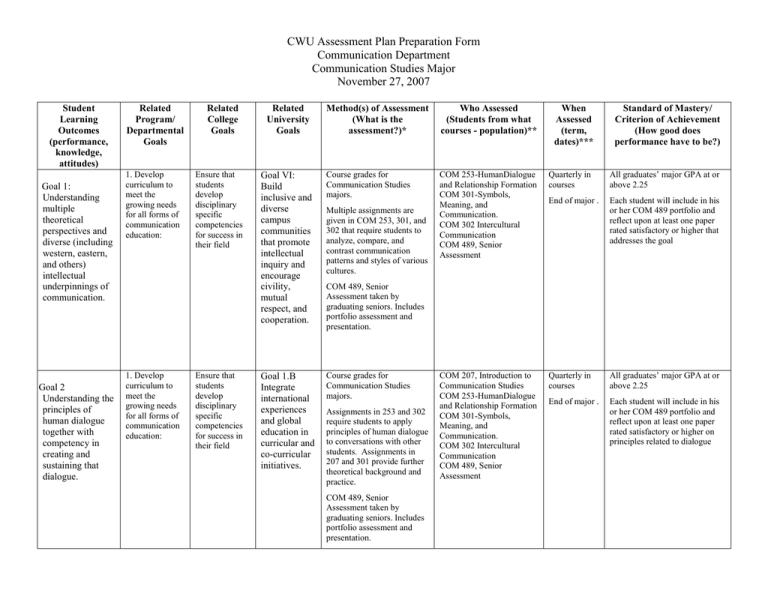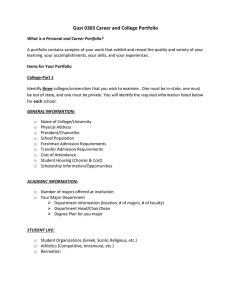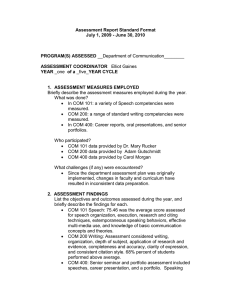CWU Assessment Plan Preparation Form Communication Department Communication Studies Major November 27, 2007
advertisement

CWU Assessment Plan Preparation Form Communication Department Communication Studies Major November 27, 2007 Student Learning Outcomes (performance, knowledge, attitudes) Goal 1: Understanding multiple theoretical perspectives and diverse (including western, eastern, and others) intellectual underpinnings of communication. 2. Goal Goal 2 Goal 2: Understanding the principles of human dialogue together with competency in creating and sustaining that dialogue. Related Program/ Departmental Goals 1. Develop curriculum to meet the growing needs for all forms of communication education: 1. Develop curriculum to meet the growing needs for all forms of communication education: Related College Goals Ensure that students develop disciplinary specific competencies for success in their field Ensure that students develop disciplinary specific competencies for success in their field Related University Goals Method(s) of Assessment (What is the assessment?)* Who Assessed (Students from what courses - population)** Goal VI: Build inclusive and diverse campus communities that promote intellectual inquiry and encourage civility, mutual respect, and cooperation. Course grades for Communication Studies majors. COM 253-HumanDialogue and Relationship Formation COM 301-Symbols, Meaning, and Communication. COM 302 Intercultural Communication COM 489, Senior Assessment Quarterly in courses All graduates’ major GPA at or above 2.25 End of major . Each student will include in his or her COM 489 portfolio and reflect upon at least one paper rated satisfactory or higher that addresses the goal Goal 1.B Integrate international experiences and global education in curricular and co-curricular initiatives. Course grades for Communication Studies majors. COM 207, Introduction to Communication Studies COM 253-HumanDialogue and Relationship Formation COM 301-Symbols, Meaning, and Communication. COM 302 Intercultural Communication COM 489, Senior Assessment Quarterly in courses All graduates’ major GPA at or above 2.25 End of major . Each student will include in his or her COM 489 portfolio and reflect upon at least one paper rated satisfactory or higher on principles related to dialogue Multiple assignments are given in COM 253, 301, and 302 that require students to analyze, compare, and contrast communication patterns and styles of various cultures. When Assessed (term, dates)*** Standard of Mastery/ Criterion of Achievement (How good does performance have to be?) COM 489, Senior Assessment taken by graduating seniors. Includes portfolio assessment and presentation. Assignments in 253 and 302 require students to apply principles of human dialogue to conversations with other students. Assignments in 207 and 301 provide further theoretical background and practice. COM 489, Senior Assessment taken by graduating seniors. Includes portfolio assessment and presentation. . Goal COM 253-HumanDialogue and Relationship Formation COM 340-Analysis and Practice of Public Communication COM 489, Senior Assessment Quarterly in courses All graduates’ major GPA at or above 2.25 End of major . Each student will include in his or her COM 489 portfolio and reflect upon at least one class presentation rated satisfactory or higher on all performance criteria and deliver a final presentation. COM 207-Introduction to Human Communication COM 340-Analysis and Practice of Public Communication. COM 350-Changin Minds: Persuasion and Culture COM 489, Senior Assessment Quarterly in courses All graduates’ major GPA at or above 2.25 End of major . Each student will include in his or her COM 489 portfolio and reflect upon at least one paper that analyzes persuasive discourse. Course grades for Communication Studies majors. COM 251-Comparative Small Group Dialogue and Leadership Quarterly in courses All graduates’ major GPA at or above 2.25 End of major . Assignments in COM 251, 365, and 451 require students to perform analyses on small groups, organizations, and to conduct original data gathering research. COM 365-Organizatoinal Communication COM 451-Communication Context Analysis and Evaluation COM 489, Senior Assessment Each student will include in his or her COM 489 portfolio and reflect upon at least one paper rated satisfactory or higher on all research based items. 1. Develop curriculum to meet the growing needs for all forms of communication education: Ensure that students develop disciplinary specific competencies for success in their field Goals I & II: Maintain and strengthen an outstanding academic and student life at all sites Course grades for Communication Studies majors. Goal 4: Competency in construction and analysis of persuasive discourse intended to influence beliefs, attitudes, values, and practices 1. Develop curriculum to meet the growing needs for all forms of communication education: Ensure that students develop disciplinary specific competencies for success in their field Goal 6.A. Integrate international experiences and global education in curricular and co-curricular initiatives. Course grades for Communication Studies majors. Goal 5 1. Develop curriculum to meet the growing needs for all forms of communication education: Goals I & II: Maintain and strengthen an outstanding academic and student life at all sites Goal 3: Competency in presentation, preferably in more than one form. Competency in systematic inquiry in the analysis of communication systems and processes (the process of asking questions and systematically attempting to answer them, and understanding the limitations of the conclusion reached). Ensure that students develop disciplinary specific competencies for success in their field Four graded presentations are required in COM 340. COM 489, Senior Assessment taken by graduating seniors. Includes portfolio assessment and presentation. Two oral presentation and on written assignments in COM 350 require students to demonstrate competency in this goal. COM 489, Senior Assessment taken by graduating seniors. Includes portfolio assessment and presentation. COM 489, Senior Assessment taken by graduating seniors. Includes portfolio assessment and presentation. *Method(s) of assessment should include those that are both direct (tests, essays, presentations, projects) and indirect (surveys, interviews) in nature **Data needs to be collected and differentiated by location (Ellensburg campus vs University Centers – see NWCCU standard 2.B.2) ***Timing of assessment should be identified at different transition points of program (i.e., admission, mid-point, end-of-program, post-program)


